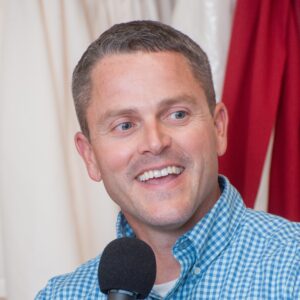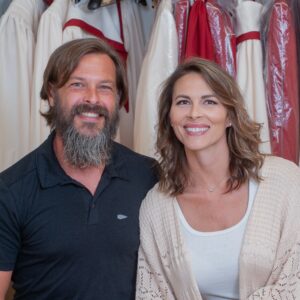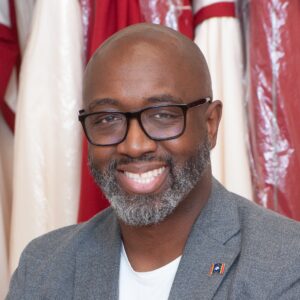By Katie Ginn
October is Pastor Appreciation Month, and we thought it only fitting to interview a few! These six servant leaders sat down with MCL Editor Katie Ginn to talk about their ministry challenges, why attending church in person is still important, and how to have godly political conversations.
MEET THE PASTORS
CJ Rhodes, Mt. Helm Baptist Church, Jackson
For 14 years, CJ has been the youngest pastor of Jackson’s oldest African American church, established in 1835! He loves preaching on the empowerment of the Holy Spirit, and divine encounters from Genesis to Revelation.

Kyle Reno, Crossgates Church, Brandon
Kyle has served as pastor of Crossgates, which recently celebrated its 50th anniversary, for a year and a half. He loves preaching on the gospel of John and on God’s restorative work in people and places.

Beau and Rachel Burnham, Vineyard Church, Flowood
The Burnhams have served as co-pastors at Vineyard for two and a half years. Beau loves preaching on the kingdom of God and the book of Ephesians. Also, he preaches barefoot, “because it’s what I see when I pray. I wear and do what the Lord shows me. (And) I believe in being yourself,” he says. Rachel loves preaching on the heart of the Father, the voice of the Lord, and the book of Hebrews.

Brian Crawford, City Light Church, Vicksburg
Brian is the founding pastor of City Light, established eight years ago. He loves preaching the letters of Paul and the implications of God’s work of reconciliation.

Barry Male, Madison Methodist Church
Barry has served as pastor at Madison Methodist, part of the Global Methodist Church, for eight years. He loves preaching the gospel of John, and also Luke and Acts, which show Jesus’ love for those on the margins.
Interview begins after photo.

Katie Ginn: What has been the biggest challenge for each of you as a pastor?
CJ Rhodes: When I got here, I was about 28, and the average age (of our church members) was about 70. (So) navigating generational differences while trying to bring newer people in. And also, our church had historically kind of been more class-conscious, a certain kind of people come to the church, (but we’re) becoming more of a church that’s open to everybody.
Some people can push back on that. (laughs) You have to lovingly engage with them and say, I understand you, I love you … but we’re going to keep doing what we’re doing to express the gospel.
Barry Male: Helping your church believe God wants to do what He wants to do … so they can believe they can disciple their family, and that it’s not the clergy that does those things.
Brian Crawford: Helping people wrestle through the problem of pain. … Also distraction – we are a deeply distracted culture. (Wrestling) through how those distractions are forming us and shaping us (is) an incredible challenge.
Kyle Reno: Moving people toward the mission of God. Is what you’re living for going to matter a million years from now? And walking through pain with people … and learning how to not carry that (home with me). There are things I can’t change.
Beau Burnham: I think we need to rethink church. (People say), “This is the way we’ve always done it,” but maybe that’s more traditions of man than Jesus.
And then for me, I can also struggle with (the idea that) I’m too much, and so I’ve got to hold back. So how do I (say) here I am, this is me, but be obedient to the Lord and what He’s called me to do?
Rachel Burnham: I’m a woman. So I struggle with, how can I even really do this? Is it allowed in the culture? Will I carry the same weight in a room? … I know I’m called to have conversations with Him and tell people what He said and let them come to Him. And He can do the rest.
Also just the life work balance, because we have teenagers.
KG: What encourages y’all and gives you hope?
RB: Any story of life change. And the manifest presence of the Lord.
BB: When I can sit back and watch (because) the saints are equipped (for the work).
KR: The next generation. They’ve got all the reasons to be distracted. So when you see them gripped by God (that’s encouraging). Also in this moment, seeing men rise. I think there’s a movement among men in America that have for too long been passive and have not led in their families in a way that their wives are flourishing, their children are flourishing – and it’s (finally) happening.
BC: When I’m able to see the church operate as family. We call ourselves brothers and sisters in Christ. It’s beautiful when you can see the church bearing one another’s burdens. We recently had a game night at church (and it) was great to see people engaging with each other.
BM: I just got back from Brazil with 30 high-schoolers, and watching those kids in the street (doing ministry), or to watch our kids this past Sunday lead worship – the church probably decades ago missed that.
And then going back to men’s ministry, (my wife) looked across to me, our first child was about 4 years old, and she said, “When are you going to start leading the family devotional?” I’m seminary trained, and I said, “I’m thinking about Monday.” (laughter all around) But I didn’t know how to do that. Men won’t do what they don’t know how to do.
So as pastors, to spend time at the lunch, at breakfast, equipping men – who will not do things (if they’ll) be embarrassed – (and then seeing) men owning their faith, believing that they can encourage each other, hold each other accountable, that’s been really exciting.
CJR: I would agree with seeing life change, particularly in a more progressive way. Amen to those moments when you hear the word and bam, your life changes overnight – but often we see someone’s life change (over several years). Or they go through multiple transformations. (And) having the patience as a pastor to walk people through that discipleship journey.
And then Gen Z, and Gen Alpha – teenagers and single-digit age kids saying they want to be saved, they want to be baptized.
KG: For those who are physically able to attend church in person, why do y’all believe this is still crucial, even in the livestream era?
CJR: There’s a real sense of fellowship and community in person. If the service says God is there … it doesn’t always translate (via video) especially if your sound isn’t great.
BM: We’ve made Christianity private (but) it’s always corporate. You can get saved on a deserted island, but you won’t get sanctified there.
BC: It’s not just what we receive, but what we give. When we talk about the shield of faith in Ephesians 6, when the Roman army of that time would use their shields, they would normally lock arm in arm. When one’s faith is weak, the other’s faith is strong.
KR: Well, what’s heaven going to be like? The thought of not experiencing that once a week … As a church, we’re an aircraft carrier; we don’t want to be a cruise ship. But if we never have a place to land together, we’ll crash and burn.
BB: Our culture doesn’t understand community very well. We’re very individualistic. (As) you learn community, you actually find out, the community isn’t (just) for you, you’re for the community. If you’re not there, the community suffers.
RB: (People should come to church) because it’s really fun. Amen! (laughter all around)
KG: How do you lead your churches in biblical answers to social and political issues?
BB: It goes back to the kingdom of God. Because no government is the answer. The kingdom of God is about setting the oppressed free. It’s about peace, joy, and righteousness.
Not saying (political issues are) not worth focusing on – yes, let’s talk about it. But if the messages that we’re so out to preach here in America, if I can’t go to other places around the world and preach them, maybe we ought to rethink that. The consistency of the kingdom of God, no matter where we are, is always relevant.
KR: We all need to (rightly) view the opportunities to vote biblically – while doing it in a manner worthy of the gospel.
I hear (people’s) tone and tenor about something political and I’ll think … did you pray before you posted that? Did you think about how effective our witness is now to a world that is in desperate need of knowing Christ before they die?
(Politics do) matter. We do have a responsibility to vote and think through those things. It just has a place, and it is not the utmost.
BC: Our church is incredibly diverse – ethnically, in class, in race, in politics. One of the things we encourage is, strive to be more prophetic than partisan. There’s going to be darkness no matter what side (of the aisle) you’re on. Be willing to push back evil with good.
CJR: We recently celebrated the 60th anniversary of Freedom Summer. Many people in our church were either Freedom Riders or housed or fed them. The Bible has a lot of things to say about justice, mercy, equity, and liberation. I think we would do well to plumb through that.
Also, the church should be seen as an embassy of the kingdom – in the world, but not of it. In Matthew 16, when Jesus says, “Upon this rock I will build My church,” that happens in Caesarea Philippi, which was like the Las Vegas strip. We are to be a Christian presence in a dark world.
KG: What would you say to Christians who feel like they can’t talk to their friends with different political views during election season?
KR: Humble your heart. We’re all wrong. When we get to heaven one day … there’s only one thing we’ve got to be right about. Listen (to your friend and) have a conversation without trying to convert them politically.
RB: I would probably encourage proximity. Nothing can change if we stay far away (from each other).
BC: We have the privilege of teaching a class (at our church) called Cultivating Healthy Relationships. We talk about moving from hearing to listening – listening is a moral act – and about moving from arrogance to humility. We also talk about moving from apathy to empathy – behind every person is a story – and about moving from moral force to moral persuasion.
BM: Watch Jesus’ life … He came full of grace and truth. … With Peter and Paul, there’s correction (when Paul corrects Peter in Galatians), but there’s love.
CJR: Ask rather than assume, and ask better questions. Don’t (start) with, “How can you be a Christian and vote for …?” (Instead ask,) “Help me understand why that’s your position.” It humanizes the other (person). Too many folks want to win arguments. Winning arguments won’t win hearts.
KG: Similarly, what encouragement would you give about having gospel conversations?
CJR: Sharing one’s story. The more vulnerable we are in telling those parts of our story, not just the curated parts … (It’s) that humanizing element.
BM: The people in our culture can question scripture, but it’s hard to argue with our story. Less than 20 percent of people come to faith through preaching.
BC: Being willing to tell people about the most important Person in your life. We’ve complicated it. We’ve professionalized it. (But) in John 4, the woman at the well says, “Let me tell you about this man.” We can overthink it, and it can paralyze us.
KR: C.S. Lewis said that a hundred years from now, every person you meet is either going to be the most beautiful being you’ve ever seen, or an object of horror.
Penn from (the illusionist duo) Penn and Teller told the story of a Christian who witnessed to him. He didn’t believe, but he said, “If you truly believe that what you do with Jesus determines whether you go to heaven or hell, how much do you have to hate somebody not to share that with them?”
BB: Our culture thinks it’s the pastor’s job … No, it’s us equipping the saints for the work of the ministry. Always be ready to give an account for the hope that’s in you – can people look at you and tell there’s hope in you?
RB: I think people are insecure that they’re going to do it wrong. So get outside and preach to a tree. Preach to your pets. It’s like anything we do – practice.
BB: The number one fear in the world is public speaking. I really think that’s an attack from the enemy.
KG: A question from a Facebook follower: How do you differentiate between a preacher who’s merely wrong on a certain issue, and a wolf in sheep’s clothing?
BC: Is that pastor willing to course correct? There needs to be a willingness to clear up any confusion, to listen to other wise leaders in their sphere. Are they living as a repentant sinner?
CJR: Deuteronomy 13, beginning in verse 1, says if a prophet appears among you and announces a sign or wonder, and the sign or wonder takes place, and the prophet says, let us follow other gods … you must not listen to the words of that prophet.
We can get interpretation wrong. That’s very different than (intentionally leading) people away from God.
BM: We are to have unity among the essentials and allow freedom in the non-essentials. And then, being correctable. In the Wesleyan tradition, we have something called band meetings, where two or three men or women would get together, and the first question you ask is, “How’d you sin (this week)?” And the preacher had to go first.
I find so many times pastors aren’t in a (group like that) because nobody can correct them.
BB: Manipulation and control is never OK, and that includes pastors. (Also) who are they pointing to – themselves and their revelation, or Jesus? (And) they should be growing in discernment. It says in Hebrews 5 that you learn to discern between good and evil with practice.
BM: You’re hitting on something, too. We’re seeing a rash of people who believe orthodox doctrine (but) are just walking over people, whether it’s at Mars Hill or somewhere else. Someone who preaches brilliantly, and then behind the scenes you find out he’s just walking over people. You can’t do that.
KG: Finally, what is the least “pastory” thing about yourself that you’re willing to share?
CJR: I won’t do any now, but I do a lot of impersonations.
BM: I am very much an introvert. I was also the lead singer and songwriter of a rock band in college.
BC: I too am an introvert. Also I am probably the biggest movie nerd you’ve ever met. Because I’m an introvert, I go to the movie theater often by myself.
BB: One word: everything. (laughs) I mean, I preach barefoot. I constantly get comments about my hair, my beard, how tan I am, and what I wear or don’t wear.
RB: I don’t know how to answer this question. Like, what do you assume pastors do? What are the stereotypes? Read the Bible …
KG: Coffee … Reading nonfiction …
RB: I actually love all of that stuff. (laughs)